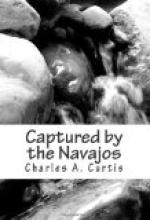We dashed up to the tents, and I rushed to the one from which I had seen the hand and tress thrust out, and called, “Brenda!” There was no response or sound. Looking into the entrance, I saw in the dim light of the awakening day the figure of a girl lying on her back, her feet extended towards me, and her head touching the rear wall. The right arm lay along her side, and the left was thrown above her head, the fingers still holding her hair.
A terrible fear seized my heart. I again called the girl by her name, but received no answer. I went in, and with nervous fingers lighted a match and stooped beside her. Horror-stricken, I saw a stream of blood threading its way across the earthern floor from her left side. I shouted for Dr. Coues, and the surgeon hurried in. From his instrument-case he took a small, portable lamp, and, lighting it, fell upon his knees beside the prostrate girl.
During the following few moments, while the skilled fingers of the firm-nerved surgeon were cutting away clothing to expose the nature of the wound, my thoughts found time to wander to the distant family, on its way to the fort, and to the boy sergeants there. I thought what a sad message it would be my province to bear to them, should this dear relative and cherished friend die by savage hands.
There was little hope that the pretty girl could live. To me she seemed already claimed by death. She who had made our long and weary march from Wingate to Whipple so pleasant by her vivacity and intelligence, and had latterly brightened our occasional visits to Skull Valley, was to die in this wretched hole.
But the tactus eruditus of the young surgeon was continuing the search for some evidence that the savage stab was not fatal, and his mind was busy with means for preserving life, should there be a chance. I watched his motions, and assisted now and then when asked, and waited with strained patience for a word upon which to base a hope.
At last the surgeon gently dropped the hand whose pulse he had long been examining, and said: “She is alive, and that is about all that can be said. You see, her hands, arms, and neck are badly scorched by the dash she made through the fire at the ranch. Then this wicked knife-thrust has paralyzed her. She has bled considerably, too, but she lives. Press your finger upon this artery—here.”
“Can she be made to live, doctor?”
“The knife has not touched a vital part, but it may have done irreparable injury. I can tell more presently.”
Nothing more was said, except in the way of direction, for some time, the surgeon working slowly and skilfully at the wound. At last, rearranging the girl’s clothing and replacing his instruments in their case, he said: “If I had the girl in the post-hospital, or in a civilized dwelling, with a good nurse, I think she might recover.”
“Can’t we give her the proper attendance here, doctor?” I asked.




